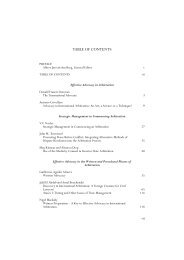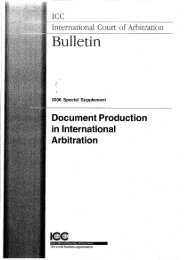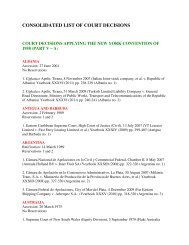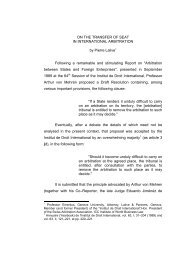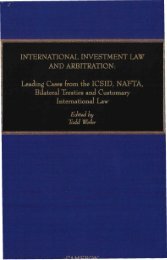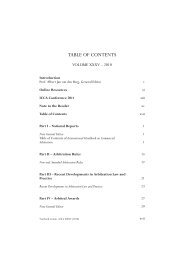Limits to Party Autonomy in International Commercial Arbitration
Limits to Party Autonomy in International Commercial Arbitration
Limits to Party Autonomy in International Commercial Arbitration
Create successful ePaper yourself
Turn your PDF publications into a flip-book with our unique Google optimized e-Paper software.
Let us now return <strong>to</strong> the orig<strong>in</strong>al problem posed at the beg<strong>in</strong>n<strong>in</strong>g of this article. The parties agree on a<br />
long period for the submission of memorials. Is the tribunal obliged <strong>to</strong> accept the parties' agreement? If<br />
the time periods are stated <strong>in</strong> the arbitration agreement, these would apply and any modification of these<br />
dates could not be agreed by the parties alone but would have <strong>to</strong> be agreed by the arbitral tribunal as well.<br />
Where, however, the arbitration agreement does not deal with the issue at hand (the date for submission<br />
of memorials) then the answer <strong>to</strong> the question of whether the parties can agree <strong>to</strong> those dates will depend<br />
on any manda<strong>to</strong>ry rule of the lex arbitri, or, if there is no applicable manda<strong>to</strong>ry rule of the lex arbitri, then<br />
the rules govern<strong>in</strong>g the arbitration; and, if there are no rules or if they are silent on the po<strong>in</strong>t, the non-<br />
manda<strong>to</strong>ry provisions of the lex arbitri.<br />
Previously reference was made <strong>to</strong> section 33 of the <strong>Arbitration</strong> Act 1996 (UK). It is expressed <strong>to</strong> be a<br />
manda<strong>to</strong>ry provision. Paragraph 33(1)(b) requires the arbitral tribunal <strong>to</strong> adopt procedures suitable <strong>to</strong> the<br />
circumstances of the particular case, avoid<strong>in</strong>g unnecessary delay or expense. At first sight it might be<br />
thought that this provision requires the arbitral tribunal <strong>to</strong> make a rul<strong>in</strong>g which will avoid "unnecessary<br />
delay or expense" and hence, perhaps, <strong>to</strong> override the parties' agreement. However the emphasis <strong>in</strong><br />
section 33 is on fairness <strong>to</strong> the parties. In circumstances where the parties have made an agreement on the<br />
procedural po<strong>in</strong>t <strong>in</strong> question, fairness would generally be served by adher<strong>in</strong>g <strong>to</strong> the agreement which the<br />
parties have reached.<br />
In the case before me there was no applicable manda<strong>to</strong>ry rule of the lex arbitri and hence the relevant<br />
pr<strong>in</strong>ciples were <strong>to</strong> be found <strong>in</strong> the applicable arbitration rules. The case be<strong>in</strong>g an ICC case and hence<br />
governed by the ICC Rules it is <strong>to</strong> the ICC Rules that we must turn <strong>to</strong> determ<strong>in</strong>e whether the parties can<br />
agree on the time for submission of memorials.<br />
A basic rule is conta<strong>in</strong>ed <strong>in</strong> article 15(1) of the ICC Rules which provides:<br />
"The proceed<strong>in</strong>gs before the Arbitral Tribunal shall be governed by these Rules and, where these Rules<br />
are silent, by any rules which the parties or, fail<strong>in</strong>g them, the Arbitral Tribunal may settle on, whether or<br />
not reference is thereby made <strong>to</strong> the rules of procedure of a national law <strong>to</strong> be applied <strong>to</strong> the arbitration."<br />
Thus this article sets out a hierarchy of rules <strong>to</strong> govern the arbitral proceed<strong>in</strong>gs as follows:<br />
1. ICC Rules<br />
2. Parties agreement<br />
3. Arbitral tribunal determ<strong>in</strong>ation<br />
Articles 15(1) would appear <strong>to</strong> confer on the parties the power <strong>to</strong> agree on an applicable procedural rule<br />
(without the agreement of the tribunal) <strong>in</strong> cases where the ICC Rules are silent. The reference <strong>to</strong> the<br />
parties' agreement is presumably not conf<strong>in</strong>ed <strong>to</strong> the parties' agreement prior <strong>to</strong> the constitution of the<br />
tribunal but would be construed as permitt<strong>in</strong>g the parties <strong>to</strong> agree, dur<strong>in</strong>g the course of the arbitration, on<br />
an appropriate rule <strong>to</strong> govern the particular procedural po<strong>in</strong>t. However the parties' agreement will only<br />
Legal\103364080.1 8



